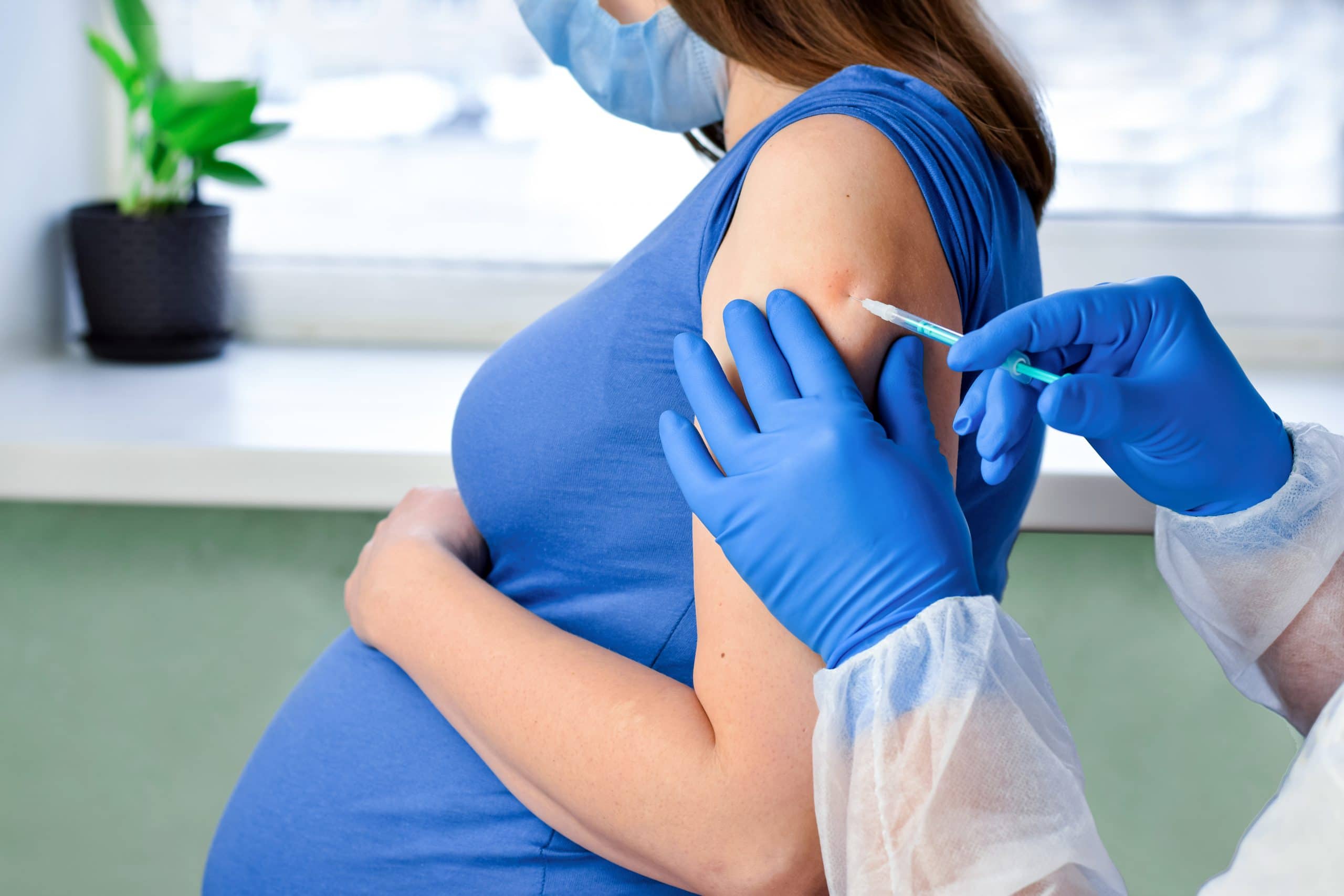FAQ
COVID-19 Vaccines: The Facts on Fertility, Pregnancy & Breast Feeding

Since the start of the pandemic, Private Health Management has been committed to keeping our clients informed of the latest COVID-19 developments. In this month’s update, we’re focusing on COVID-19 vaccines and addressing concerns about fertility, pregnancy, and breastfeeding. Here, our team of PhD-led research experts debunk the myths and share our latest findings.
Where did the myth that COVID-19 vaccines can affect fertility come from?
It is known that a protein called syncytin-1, which plays a key role in normal placental formation and successful pregnancies, has some broad structural similarities to a number of viral proteins, including the coronavirus spike protein as well as proteins found in influenza and HIV (1). The proteins all play similar roles in cell attachment. Towards the end of 2020, this similarity was suggested as evidence by a European epidemiologist that vaccines used against COVID-19 would also target syncytin-1 and thereby make people infertile. However, the fact is that while syncytin-1 and the coronavirus spike protein are in the same family of membrane proteins, they are actually very different at the level of immune system recognition (2). This means that immune responses against the spike protein triggered by vaccine administration are very unlikely to attack syncytin-1. In support of this, emerging evidence from early clinical trials is demonstrating that the vaccines do not impact fertility, and online claims about infertility as a result of the COVID-19 vaccinations have not been substantiated.
Why weren’t pregnant women included in the clinical trials for the COVID-19 vaccines?
It is a common practice for clinical trials to exclude pregnant women, particularly in the early stages of clinical development when short term safety is being assessed. However, given that tens of thousands of women participated in the trials, we now know that a small number of them did become pregnant in between doses or shortly after vaccination, and no significant adverse effects were reported. In fact, of the 23 women who became pregnant during the Pfizer trial, only one suffered a miscarriage, but that individual had been given the placebo, not the vaccine.
Can the COVID-19 vaccine affect fertility?

Despite media reports, there is no scientific evidence, nor any scientific rationale, that the COVID-19 vaccines affect fertility in women or men. While not specifically studied as a clinical outcome in the original trials, no loss of fertility or fertility complications has been reported among trial participants; additional studies and data monitoring are ongoing (2). Experts in reproductive health continue to recommend the COVID-19 vaccine, and this is supported by health agencies worldwide. The World Association of Perinatal Medicine (WAPM), has reported a retrospective analysis on vaccination and fertility and issued a position statement on behalf of the American College of Obstetricians and Gynecologists (ACOG), the American Society for Reproductive Medicine (ASRM) and the Society for Maternal-Fetal Medicine (SMFM) in strong support of vaccination.
Are you aware of pregnant women being safely vaccinated?
Yes. As of June 14, 2021, more than 124,000 v-safe participants (the smartphone tool to tell the CDC about any side effects after getting the COVID-19 vaccine) indicated they were pregnant at the time they received a COVID-19 vaccine. In an initial analysis of over 35,000 participants, vaccine side effects were not substantively different than reported in the general population. And, in a preliminary analysis of over 800 individuals who were vaccinated while pregnant and had delivered their babies, no safety concerns were identified (3).
Should I receive the COVID-19 vaccine if I’m pregnant?
Yes. Vaccination in pregnancy is safe and effective at preventing COVID-19, which can be more serious in pregnant women, particularly in their third trimester. Emerging data on this front is very reassuring. For example, in three of the vaccine clinical trials conducted in the United Kingdom, 57 pregnancies occurred, with no significant difference in the rate of pregnancies in the vaccinated group compared to control. In addition, the miscarriage rates were comparable between the groups, indicating no detrimental effect of vaccination on early pregnancy.(2) Moreover, in the U.S. as of February 2021, 20,000 pregnant women had received a COVID-19 vaccine, and no red flags have been raised.
Is there a preferred vaccine when you are pregnant?
While pregnant individuals were not included in Phase III trials for COVID-19 vaccines, an mRNA vaccine (i.e., from Pfizer-BioNTech or Moderna) may be preferred based on recently published safety data (3). If you have a specific concern in regard to an allergy or previous reaction following any vaccination, you should discuss with your health care provider to help determine what is right for you.
What happens if I get COVID-19 while pregnant?

In a recent multinational study of 706 pregnant women with COVID-19 and 1424 pregnant women without COVID-19, those with COVID-19 were at higher risk for hospitalization and complications, including maternal mortality, preeclampsia, and preterm birth (4). In addition, studies comparing vaccinated and unvaccinated women who contracted COVID-19 while pregnant have reported significantly worse outcomes for the unvaccinated women, including higher rates of early terminations.
Getting COVID-19 during pregnancy does increase risk and cause for concern as studies showed the risk of premature birth increases five-fold for women who contract COVID-19 and become seriously unwell during pregnancy.
Are pregnant women at higher risk of increased infection?
Pregnant women do not appear to be at higher statistical risk of contracting COVID-19 infection compared to age matched controls. As the most severe outcomes from an infection correlate with age, most pregnant women who become infected with COVID-19 will have mild-to-moderate symptoms and many can be asymptomatic similar to their age group. However, unvaccinated pregnant women have higher rates of hospitalization and complications from a COVID-19 infection compared to vaccinated pregnant women (4).
When is the best time to receive the COVID-19 vaccine during pregnancy (i.e., first, second or third trimester?)
The timing for vaccination during pregnancy should be considered in relation to other vaccines, such as the flu shot which is also routinely recommended during pregnancy. If you choose to receive the COVID-19 vaccine during pregnancy or the postpartum period, the CDC recommends scheduling at least 14 days before or 14 days after any other vaccination. Please talk to your health provider about the best timing for the COVID-19 vaccine. There is no standard recommended timeframe for vaccination during pregnancy. Getting vaccinated as soon as possible should be considered to avoid complications from a potential infection.
What are the risks if I have a SARS-CoV-2 infection when I give birth?
In an analysis of 342,080 women registered in a national database of hospital admissions in England, 3,527 had laboratory-confirmed SARS-CoV-2 infection and gave birth between May 29, 2020 and January 31, 2021 (5). Maternal and perinatal outcomes were compared between pregnant women with a laboratory-confirmed SARS-CoV-2 infection recorded and those without. Fetal death and preterm birth occurred more frequently in women with SARS-CoV-2 infection than those without. Risk of birth by emergency Caesarean delivery and prolonged admission following birth were significantly higher for women with COVID-19 than those without. In addition, although rare, there are reports of in utero transmission of the virus via the placenta. It is better to get the vaccine during pregnancy or while caring for a newborn than to risk getting a COVID-19 infection.
Is it safe to get the vaccine if I am breastfeeding?
Yes. Getting vaccinated while breastfeeding not only protects you, but also protects the baby too. Breast feeding delivers antibodies through your breast milk. Recent studies have shown that COVID-19 antibodies are detected in breast milk from lactating mothers who have been infected with COVID-19, offering some protection to the newborn (6). Further, studies in Israel of Pfizer-BioNtech vaccine recipients who were breastfeeding also showed evidence of anti-COVID-19 antibodies transferred via breast milk, and the antibody amount was increased following the second dose (7). Thus, vaccination provides protection for the new mother while caring for a newborn and that protection is shared with the baby.
(1) Gong, R. et al. Structural characterization of the fusion core in syncytin, envelope protein of human endogenous retrovirus family W. Biochemical and Biophysical Research Communications 331, 1193-1200, doi:10.1016/j.bbrc.2005.04.032 (2005).
(2) Male, V. Are COVID-19 vaccines safe in pregnancy? Nat Rev Immunol 21, 200-201, doi:10.1038/s41577-021-00525-y (2021).
(3) Shimabukuro, T. T. et al. Preliminary Findings of mRNA Covid-19 Vaccine Safety in Pregnant Persons. New England Journal of Medicine 384, 2273-2282, doi:10.1056/NEJMoa2104983 (2021).
(4) Villar, J. et al. Maternal and Neonatal Morbidity and Mortality Among Pregnant Women With and Without COVID-19 Infection. JAMA Pediatrics, doi:10.1001/jamapediatrics.2021.1050 (2021).
(5 ) Gurol-Urganci, I. et al. Maternal and perinatal outcomes of pregnant women with SARS-CoV-2 infection at the time of birth in England: national cohort study. Am J Obstet Gynecol, doi:10.1016/j.ajog.2021.05.016 (2021).
(6 ) Gray, K. J. et al. COVID-19 vaccine response in pregnant and lactating women: a cohort study. medRxiv, 2021.2003.2007.21253094, doi:10.1101/2021.03.07.21253094 (2021).
(7 ) Shimabukuro, T. T. et al. Preliminary Findings of mRNA Covid-19 Vaccine Safety in Pregnant Persons. New England Journal of Medicine, doi:10.1056/nejmoa2104983 (2021).
Always seek the advice of your physician or other qualified health provider with any questions you may have regarding a medical condition.

